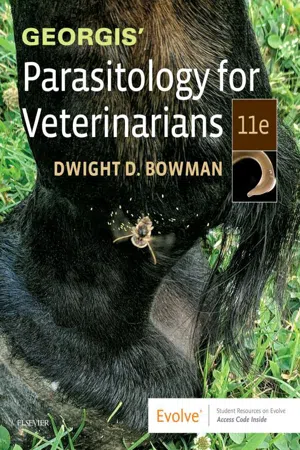
eBook - ePub
Georgis' Parasitology for Veterinarians E-Book
Dwight D. Bowman
This is a test
- 528 pages
- English
- ePUB (adapté aux mobiles)
- Disponible sur iOS et Android
eBook - ePub
Georgis' Parasitology for Veterinarians E-Book
Dwight D. Bowman
Détails du livre
Aperçu du livre
Table des matières
Citations
À propos de ce livre
Georgis' Parasitology for Veterinarians, 11 th Edition provides the most current information on all parasites commonly encountered in veterinary medicine, including minor or rare parasites to assist in the diagnosis of difficult cases. While primarily focused on parasites that infect ruminants, horses, pigs, dogs, and cats, this comprehensive text also covers organisms that commonly infect laboratory animals and exotic species. More than 600 high-quality, color photographs and illustrations help you learn how to easily identify and treat parasites of every kind.
- The most comprehensive parasitology content available, written specifically for veterinarians, provides complete information on all parasites commonly encountered in veterinary medicine, as well as information about minor or rare parasites.
- High-quality color photographs and illustrations make the process of identifying and treating parasites more accurate and efficient.
- NEW! Updated vaccines chapter keeps you up to date with what's currently happening in the field, as well as future prospects.
- NEW! Sections on new compounds in antiparasitic drugs provide coverage of the latest developments.
- NEW! Updated chapter on vector-borne diseases offers more in-depth detail on this topic.
- NEW! Enhanced eBook on Student Consult contains chapter review questions and answers, flashcards, and canine and feline parasite posters to help increase your retention of difficult subject matter.
- NEW! Updated chapter on parasite diagnostics includes new pictures and plates.
- NEW! Updated drug tables offer the most current information on drugs, vaccinations, and parasiticides.
Foire aux questions
Comment puis-je résilier mon abonnement ?
Il vous suffit de vous rendre dans la section compte dans paramètres et de cliquer sur « Résilier l’abonnement ». C’est aussi simple que cela ! Une fois que vous aurez résilié votre abonnement, il restera actif pour le reste de la période pour laquelle vous avez payé. Découvrez-en plus ici.
Puis-je / comment puis-je télécharger des livres ?
Pour le moment, tous nos livres en format ePub adaptés aux mobiles peuvent être téléchargés via l’application. La plupart de nos PDF sont également disponibles en téléchargement et les autres seront téléchargeables très prochainement. Découvrez-en plus ici.
Quelle est la différence entre les formules tarifaires ?
Les deux abonnements vous donnent un accès complet à la bibliothèque et à toutes les fonctionnalités de Perlego. Les seules différences sont les tarifs ainsi que la période d’abonnement : avec l’abonnement annuel, vous économiserez environ 30 % par rapport à 12 mois d’abonnement mensuel.
Qu’est-ce que Perlego ?
Nous sommes un service d’abonnement à des ouvrages universitaires en ligne, où vous pouvez accéder à toute une bibliothèque pour un prix inférieur à celui d’un seul livre par mois. Avec plus d’un million de livres sur plus de 1 000 sujets, nous avons ce qu’il vous faut ! Découvrez-en plus ici.
Prenez-vous en charge la synthèse vocale ?
Recherchez le symbole Écouter sur votre prochain livre pour voir si vous pouvez l’écouter. L’outil Écouter lit le texte à haute voix pour vous, en surlignant le passage qui est en cours de lecture. Vous pouvez le mettre sur pause, l’accélérer ou le ralentir. Découvrez-en plus ici.
Est-ce que Georgis' Parasitology for Veterinarians E-Book est un PDF/ePUB en ligne ?
Oui, vous pouvez accéder à Georgis' Parasitology for Veterinarians E-Book par Dwight D. Bowman en format PDF et/ou ePUB ainsi qu’à d’autres livres populaires dans Medicine et Veterinary Medicine. Nous disposons de plus d’un million d’ouvrages à découvrir dans notre catalogue.
Informations
1: Introduction
Common terms in parasitology
A parasite is a smaller organism that lives on or in and at the expense of a larger organism called the host. A louse is a parasite and so is a virus. The host’s expenses in supporting its parasites may be trivial, or they may be substantial or even unbearable. This depends on the number of parasites, the kind and degree of injury they inflict, and the vigor and nourishment of the host. A series of terms (e.g., mutualism, commensalism, parasitism) have been defined to express the degree of unilateral or mutual injury or benefit that is characteristic of particular symbiotic relationships. As a matter of convention, however, if the smaller organism is found in association with humans or with animals or plants that humans esteem, it is called a parasite, whether its presence is detrimental, indifferent, or beneficial. This convention is adopted in this book and is harmless enough, provided we remember that parasites vary in pathogenicity.
A species of animal is an interbreeding natural population that is reproductively isolated from other such populations. For example, there are two species of rather distantly related ascarid parasites of dogs: Toxocara canis and Toxascaris leonina. These two species are sufficiently similar in size and appearance to present some difficulty in their differentiation, but although they may share the small intestine of the same dog, they never interbreed. The consequent distinctness of their genetic material is expressed in modest differences in structure and in very substantial differences in life history. T. canis and T. leonina, however, share enough similarities to make their kinship obvious. We assume that these similarities stem from the evolution of both species from common ancestral stock (divergent evolution) because the number and nature of the similarities induce us to reject the alternative explanation—that is, that they represent the adaptations of unrelated forms to the same selection pressures (convergent evolution). We recognize kinship of T. canis and T. leonina by considering both to be members of the same zoologic order (Ascaridida); each is a leaf, if you will, on the same evolutionary branch.
Conventions of taxonomic classification
Peopl...